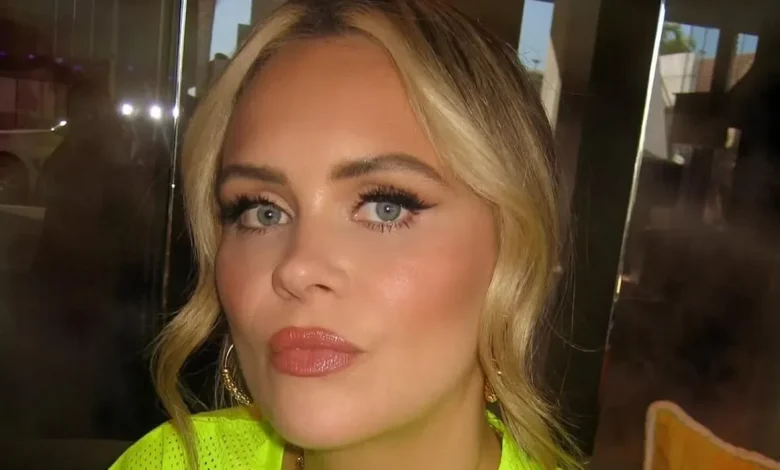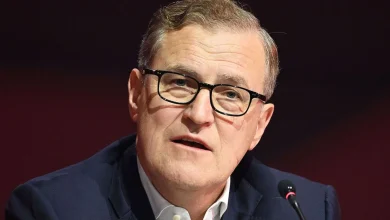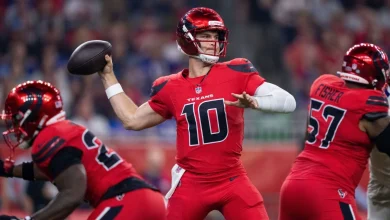‘I had to press eject on my life’ Joanne McNally looks back on her eating disorder as a ‘blessing’ in disguise

Joanne McNally never set out to be one of Ireland’s biggest comedy stars. She had an unfulfilling career in PR but after hitting a low point at the age of 30, she was forced to ‘recalibrate’ and set off on a completely new path.
The comedian and podcast host, 42, joined Miriam O’Callaghan on her RTÉ Radio show on Sunday to discuss her rise to fame, the career she almost had in nursing, and her new show Pinotphile.
With plenty of her trademark self-deprecating humour, Joanne opened up to Miriam about her life before comedy – and the ‘eject’ moment that changed everything.
Pic: Joanne McNally/Instagram
Joanne confessed that growing up she had wanted to become a nurse, saying she loved the idea of the ‘camaraderie’ but that her mum, Pat, who was a nurse herself, strongly advised her not to as she felt ‘nurses aren’t respected enough’.
However, it was also Pat who was initially ‘mortified’ at her daughter’s comedy and acting career as she viewed it as a hobby not a job and didn’t want to tell the rest of her family – but eventually came around to the idea after Joanne was invited on the Late Late Show!
The conversation soon turned to the ‘weird pivot’ that Joanne’s life took after an eating disorder caused her to ‘press eject’ on her life, quit her job in PR, and move back in with her mum.
Joanne and her mother, Pat. Pic: Joanne McNally/Instagram
The circumstances became the launchpad for a whole new career in comedy as Joanne says, ‘it meant I had to recalibrate completely’.
Joanne said: ‘I was kind of circling the plug hole of an eating disorder for a very long time. And then once I got into mainstream employment and realised this was my life and this was an adult, and I felt very unfulfilled by the whole thing. And then I just went straight down the plug hole because it was almost something to do.
‘I think I wanted to be successful at something. And then I didn’t have the confidence to go into the writing, the acting… So, then I just decided being thin would be my job.
‘And then I had to leave everything and I had to leave PR and I had to go home to my mum’s. And that’s what I ended up getting into acting and comedy. It was all a very, very lucky, weird pivot.’
Laura Whitmore, Joanne Mcnally and Vogue Williams attend the VIP launch of Samba Room. Pic: Dave Benett/Getty Images
Joanne said she feels ‘everyone has had this kind of disordered period of eating in their lives’ but most people don’t let it consume them and they recover and move on with their lives.
Joanne said: ‘[My eating disorder] took over to the point where I kind of had to press eject on my life, which in hindsight was actually a blessing because that meant I had to recalibrate completely.
She continued: ‘And if I hadn’t had to recalibrate completely, I never would have ended up doing acting and I never would have got into stand up and I wouldn’t be sitting here and I love my life so much and I love my job so much.’
Joanne started a blog called Eat The Pastry while an outpatient in recovery for bulimia and anorexia, which kick-started a series of events that led her down the path to comedy. She was soon given a column in Life Magazine, and then Úna McKevitt offered her a part in her play called Singlehood. It was there that comedian PJ Gallagher came to see her in the play and spotted her talent.
Pic: Joanne McNally/Instagram
Joanne said: ‘[PJ] was very instrumental in getting me involved in stand-up and he was very encouraging. And I think if it wasn’t for between Úna and PJ, I never would have done any of it, to be honest. So, I’m eternally grateful because I was kind of protected at the start.
‘I didn’t go down and do open spots off my own bat at the start, because I ended going on tour with PJ then and kind of did five minutes in between him and Eric Lalor on his tour, which I think was called Concussion. And then by the end of that tour, I had about 20 minutes.
‘And then I got signed in the UK. So it was quite quick at the start. And I got opportunities at the start. A lot of them were because, well, I was new and there was a need or a want for female comedians.’




